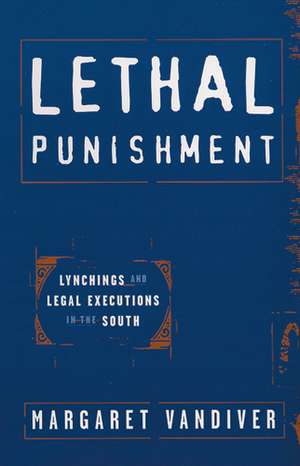Lethal Punishment: Lynchings and Legal Executions in the South
Autor Margaret Vandiveren Limba Engleză Paperback – 8 dec 2005
Why did some offenses in the South end in mob lynchings while similar crimes led to legal executions? Why did still other cases have nonlethal outcomes? In this well-researched and timely book, Margaret Vandiver explores the complex relationship between these two forms of lethal punishment, challenging the assumption that executions consistently grew out of-and replaced-lynchings.
Vandiver begins by examining the incidence of these practices in three culturally and geographically distinct southern regions. In rural northwest Tennessee, lynchings outnumbered legal executions by eleven to one and many African Americans were lynched for racial caste offenses rather than for actual crimes. In contrast, in Shelby County, which included the growing city of Memphis, more men were legally executed than lynched. Marion County, Florida, demonstrated a firmly entrenched tradition of lynching for sexual assault that ended in the early 1930s with three legal death sentences in quick succession.
With a critical eye to issues of location, circumstance, history, and race, Vandiver considers the ways that legal and extralegal processes imitated, influenced, and differed from each other. A series of case studies demonstrates a parallel between mock trials that were held by lynch mobs and legal trials that were rushed through the courts and followed by quick executions.
Tying her research to contemporary debates over the death penalty, Vandiver argues that modern death sentences, like lynchings of the past, continue to be influenced by factors of race and place, and sentencing is comparably erratic.
Vandiver begins by examining the incidence of these practices in three culturally and geographically distinct southern regions. In rural northwest Tennessee, lynchings outnumbered legal executions by eleven to one and many African Americans were lynched for racial caste offenses rather than for actual crimes. In contrast, in Shelby County, which included the growing city of Memphis, more men were legally executed than lynched. Marion County, Florida, demonstrated a firmly entrenched tradition of lynching for sexual assault that ended in the early 1930s with three legal death sentences in quick succession.
With a critical eye to issues of location, circumstance, history, and race, Vandiver considers the ways that legal and extralegal processes imitated, influenced, and differed from each other. A series of case studies demonstrates a parallel between mock trials that were held by lynch mobs and legal trials that were rushed through the courts and followed by quick executions.
Tying her research to contemporary debates over the death penalty, Vandiver argues that modern death sentences, like lynchings of the past, continue to be influenced by factors of race and place, and sentencing is comparably erratic.
Preț: 217.75 lei
Preț vechi: 277.18 lei
-21% Nou
Puncte Express: 327
Preț estimativ în valută:
41.67€ • 43.24$ • 34.83£
41.67€ • 43.24$ • 34.83£
Carte indisponibilă temporar
Doresc să fiu notificat când acest titlu va fi disponibil:
Se trimite...
Preluare comenzi: 021 569.72.76
Specificații
ISBN-13: 9780813537290
ISBN-10: 0813537290
Pagini: 304
Dimensiuni: 152 x 229 x 15 mm
Greutate: 0.45 kg
Ediția:None
Editura: Rutgers University Press
Colecția Rutgers University Press
ISBN-10: 0813537290
Pagini: 304
Dimensiuni: 152 x 229 x 15 mm
Greutate: 0.45 kg
Ediția:None
Editura: Rutgers University Press
Colecția Rutgers University Press
Notă biografică
Margaret Vandiver is a professor in the department of criminology and criminal justice at the University of Memphis.
Cuprins
Legal and extralegal executions in the American South
Lethal punishment in Tennessee and Florida
Eleven lynchings for every execution: lethal punishment in northwest Tennessee
"There can be nothing but death": lethal punishment for rape in Shelby County, Tennessee
"The first time a charge like this has ever been tried in the courts": the end of lynching in Marion County, Florida
The mob and the law: mock trials by mobs and sham legal trials
"The first duty of a government": lynching and the fear of anarchy
When the mob ruled: the lynching of Ell Persons
Prevented lynchings: white intervention and black resistance
"No reason why we should favor lynching or hanging": efforts to end legal and extralegal executions in Tennessee
Lethal punishment in Tennessee and Florida
Eleven lynchings for every execution: lethal punishment in northwest Tennessee
"There can be nothing but death": lethal punishment for rape in Shelby County, Tennessee
"The first time a charge like this has ever been tried in the courts": the end of lynching in Marion County, Florida
The mob and the law: mock trials by mobs and sham legal trials
"The first duty of a government": lynching and the fear of anarchy
When the mob ruled: the lynching of Ell Persons
Prevented lynchings: white intervention and black resistance
"No reason why we should favor lynching or hanging": efforts to end legal and extralegal executions in Tennessee
Descriere
Tying her research to contemporary debates over the death penalty, Vandiver argues that modern death sentences, like lynchings of the past, continue to be influenced by factors of race and place, and sentencing is comparably erratic.
